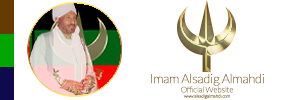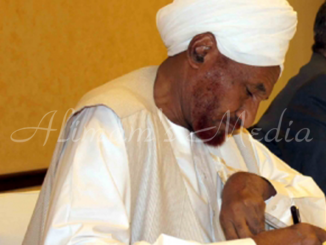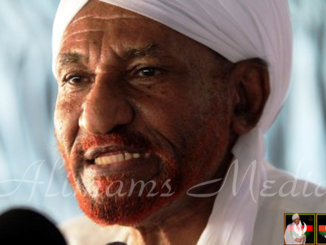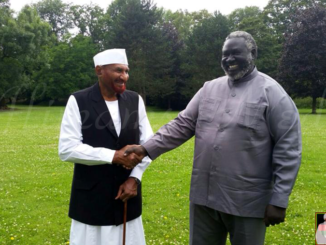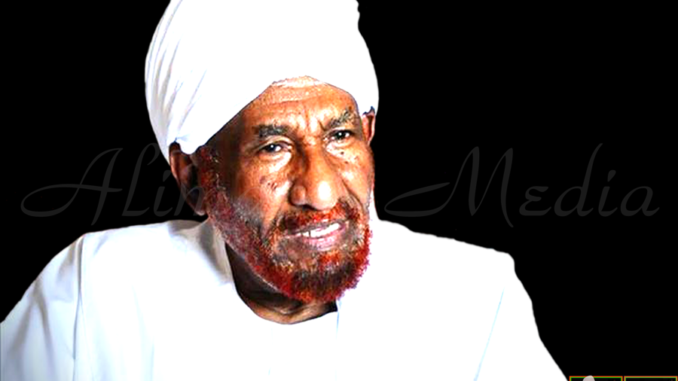
SADIQ AL-MAHDI Former Prime Minister of Sudan
‘The civil war has left South Sudan in two failed states’
‘Islam believes in equality between men and women and respects religious pluralism’
‘It is inhumane that Mariam [condemned for apostasy] gave birth chained in prison’
MARA MARTÍN MATILLA – Madrid
10 July 2014
Sadig Al-Mahdi, former prime minister of Sudan (1966-1967, 1986-1989) after the military dictatorship, is on a lightning visit to Spain. He has come with the Club de Madrid, of which he is one of the most active members. This organization helps countries move from dictatorship to democracy through its 97 members, all democratically elected presidents and prime ministers.
He has been tortured and arrested several times in his country, the last one last May for accusing military forces of abusing violence against civilians in Darfur. He has been exiled in countries such as Egypt and created the National Democratic Front (NDF) composed of the Umma, the Democratic Unionist Party and the Muslim Brotherhood.
From his position in moderate Islam, he talks to THE WORLD and analyzes the reasons for instability in the Middle East, for which he proposes an international conference in which the true reasons for the growing radicalization of Islam in the countries of the East are studied. Next.
On Wednesday, the third anniversary of the independence of South Sudan, the youngest country in the world, has been ‘celebrated’. How is the country today?
After several unsuccessful peace attempts, South Sudan is a country immersed in a civil and tribal war for six months. The two majority tribes, the Nuer and the Dinka, remain in conflict and also their leaders. Despite the mediation of neighboring countries, all possibilities of reconciliation have failed, and unfortunately, the country has been divided into two failed states, which is very worrying. The situation has not only not improved in these years, it has deteriorated even more and the conflict continues.
Why do you continue to fight for democracy in Sudan despite having been arrested several times, suffered the repression of the military regime and have even had to leave the country on several occasions?
Because everyone wants and needs freedom. It is necessary to restore it after failure, in all senses: of the military regime, in the economic sphere, guaranteeing the security of citizens and in international relations. We are working to achieve a non-violent system based on two basic pillars: peace and democratic transformation. We fight for it and we think it can be achieved.
What do you think about the case of Mariam Ibrahim, the Sudanese woman who was imprisoned after being accused of apostasy for converting to Christianity, and gave birth in chains?
First, there is no penalty for punishing apostasy in Islam, so the current legal system in Sudan is wrong in relation to this. Second, it contradicts religious freedom, which is included in all international conventions on Human Rights. What has happened is something inhuman. It is very negative for both the reputation of Islam and the reputation of the country.
What do you think is the role of women in Islam?
Islam, in principle, believes in the equality of the two genders, but many Muslim jurists and thinkers have diverse and divided opinions on this principle. Some fatwas, some Islamic states and regulations deprive women of their fundamental and religious rights. It is another of the issues on which we are working to eliminate these obstacles and defend the rights of women.
Can Islam, democracy and freedom coexist?
Yes, in fact the principles of Islam respect religious plurality, so that different religions can and should coexist. Another of the bases is the non-obligatory nature of religion. In addition, it supports the need for justice, which is equivalent to the principle of monotheism. It also says that the fact that people are not free is not moral. For what justice is equivalent to monotheism and freedom is equal to morality. Thus, the system that guarantees and protects these two maxims is the democratic system.
What do you think about the relationship between Western and Islamic countries now that the image of the latter is increasingly deteriorated by the conflicts that are occurring especially in the Middle East region?
I think that Islam calls for mutual recognition between religions and for peace between states. However, there are some aspects that have led to hostilities such as imperialism, social injustice or the fact that some powerful countries have supported dictators in the Muslim world. These factors and others have created problems, which have provoked violent responses. To eradicate terrorism it is necessary to attend to its causes and not only to implement security measures.
What is moderate Islam, in which you are framed, and what are the differences with radical Islam?
Islam is always moderate, radical Islam is a failure in the expression of religion. Islam is a decentralized religion, with several ramifications, which does not have an authority like the Pope or the Vatican, so its organization is complicated but it is open to various reforms. It is necessary to eradicate fanaticism, which damages the global image of Islam.
Why is jihadism growing in the Middle East?
There are many reasons. It is the consequence of various grievances to which the jihadists respond with an incorrect defense. The violence that some countries have adopted against the jihadist threat is a response in the wrong direction since it generates more shocks. The problem is that it has gone from a single center of violence to a network that leads to state violence, which is very dangerous. After 9/11, what happened in Madrid and in London, terrorism has increased, which now has several outbreaks. One of the reasons why I collaborate with the Club de Madrid is to propose an international conference to study the real problems of the Middle East and the reasons why violence has grown in the last ten years.
How will what is happening in Iraq and Syria affect the world?
For the countries of the area, the destruction of states increases wars based on identity and have dangerous consequences. For the western countries, the effects may be the increase in the price of oil, which will negatively affect the economy, an increase in illegal immigration and greater violence detached from the borders.
At present there is an escalation of violence between Israel and the ANP, can they get to understand each other?
No, never, because both are very polarized. Israel has great international support. The international community, led by the United States, should have imposed peace, if not, they will continue to face each other forever. On the other hand, Hamas is a product of Israel’s attack, but its actions have been radicalized. I reiterate that it is necessary to address the causes of violence, in this case, produced in part by Israel’s expansionism. The two positions are far apart and the international society seems to be blind to the situation.
How far will the repression of the Muslim Brotherhood in Egypt go?
I think the Brotherhood has made several mistakes that have created reactions against them, but now the repression has gone too far. The Muslim Brothers must review their current position to become an organization that can be framed within the political system of the country. This will be possible if both the Brotherhood and the regime in power re-examine their positions to be able to coexist, because there is no way to eradicate the Muslim Brotherhood with security measures. At present, the Brotherhood can not recover its authority if they continue to fight among themselves and generate instability. That is why [in the Club de Madrid] we call for an understanding between Islamism and secularism through a conference. One can take as an example the West, where there is a coexistence between the State and the Church and between different identities, after several wars throughout history. It is unattainable to eradicate the religion of public life in Near Eastern or Islamic countries. What you have to do is accept plurality, diversity, equality of citizens and democracy. With the arrival of Al Sisi, it is necessary to redirect these two antagonistic positions.
What is the role of the international community in these global crises?
The international community has a great responsibility in what is happening. For example, they supported and financed Al Qaeda to fight the Soviet Union. In this way, it is partly to blame for the escalation of violence. In addition, there have been some wrong policies in countries such as Afghanistan or Iraq. On the other hand, the international society is ignorant when diagnosing many situations of crisis and for that reason its solutions are confused. For example, the United Nations has weaknesses, represents the United States more and is not the appropriate forum to discuss these issues. The situation is different from the Second World War, when the organization was created, so it is necessary to review their positions. In many countries, religions have become a fundamental part of public life and that is not taken into account by the UN. For this reason, the Club de Madrid is relevant because of its more objective diagnosis of what is happening, in order to avoid making the same mistakes and to seek solutions based on the origin of the violence.
El Mundo
